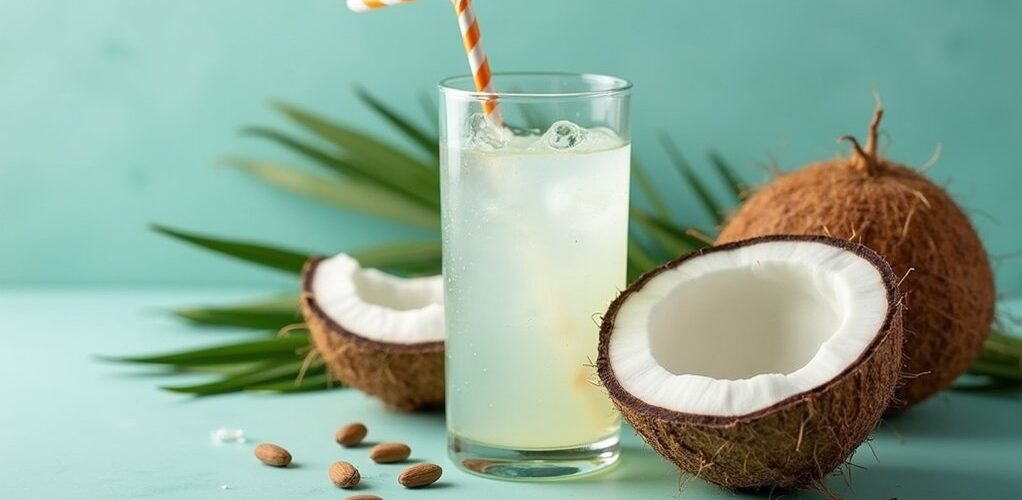
Coconut water contains moderate carbohydrate levels, with approximately 6 grams of net carbs per cup (240ml), making it neither strictly low-carb nor high-carb. While it offers valuable electrolytes and nutrients, those following strict low-carb diets should monitor their portions carefully. Unsweetened varieties contain fewer carbs than flavored options, which can have up to 15g of sugar per serving. Understanding coconut water's nutritional profile helps determine its place in various dietary approaches.
Key Takeaways
- Coconut water contains moderate carbs with approximately 6 grams of net carbs per cup (240ml), making it not strictly low-carb.
- It has fewer carbs than regular sodas and fruit juices but more than zero-carb alternatives like water or unsweetened almond milk.
- Pure coconut water contains about 4.24 grams of natural sugars per 100g, with no added sugars in unsweetened varieties.
- The electrolyte benefits may outweigh carb concerns for some, providing essential potassium and magnesium for hydration and muscle function.
- Choose 100% pure coconut water without added sugars and practice portion control to fit it into a low-carb lifestyle.
Understanding Coconut Water's Carbohydrate Content
While coconut water has gained popularity as a natural beverage choice, understanding its carbohydrate content is vital for those following a low-carb or ketogenic diet. One cup (240 ml) of plain coconut water contains approximately 15 grams of carbohydrates, with about 6 grams of net carbs per serving.
For individuals following a ketogenic diet with a daily carb limit of 20-50 grams, coconut water can be incorporated in moderation. However, it's important to note that commercial varieties may contain added sugars, greatly increasing the carbohydrate content.
Tender coconut water typically provides 9 grams of carbohydrates per cup, while raw coconut water contains roughly 4.24 grams per 100-gram serving, making it a relatively low-carb option when consumed mindfully.
Natural Sugars and Net Carbs in Coconut Water
Understanding how natural sugars contribute to coconut water's net carb content helps individuals make informed decisions about incorporating this beverage into their low-carb lifestyle.
Coconut water contains approximately 4.24 grams of net carbs per 100 grams, with natural sugars comprising the majority of its carbohydrate content. A standard one-cup serving typically provides around 6 grams of net carbs, though this amount can vary between products.
A single cup of coconut water delivers roughly 6 grams of net carbs, primarily from its natural sugar content.
Commercial coconut water brands may contain additional sugars, which can markedly increase the total carbohydrate content. For those following a ketogenic or low-carb diet, it's vital to account for these natural sugars within their daily carb allowance of 20 to 50 grams.
Careful label reading is essential, as added sugars in processed varieties can impact the beverage's overall carbohydrate profile.
Comparing Coconut Water to Other Beverages
Coconut water stands out favorably when compared to common beverages like soda and sports drinks, containing just 4.24 grams of net carbs per 100 grams versus soda's hefty 39 grams per serving.
While almond milk offers an even lower-carb alternative with less than 1 gram per cup, coconut water provides superior natural electrolytes and hydration benefits that many processed drinks lack.
The significant difference in sugar content between coconut water and conventional sugary drinks makes it an attractive option for those monitoring their carbohydrate intake while seeking natural hydration sources.
Popular Drink Carb Comparison
When comparing popular beverages by their carbohydrate content, coconut water emerges as a moderate option with 4.24 grams of net carbs per 100 ml serving. Traditional sugary drinks contain substantially higher carb counts, with regular soda reaching up to 12 grams per 100 ml, while sports drinks typically range between 6-8 grams. For those seeking low-carb options, unsweetened almond milk stands out as an excellent choice.
| Beverage Type | Carbs per 100ml |
|---|---|
| Regular Soda | 10-12g |
| Orange Juice | 9g |
| Sports Drinks | 6-8g |
| Coconut Water | 4.24g |
This comparison demonstrates that while coconut water isn't the lowest-carb beverage available, it offers a significant reduction in carbohydrates compared to many common drinks, making it a reasonable choice for those moderating their carb intake.
Natural Hydration Source Analysis
As natural hydration sources continue to gain popularity, a detailed analysis reveals that coconut water stands out among beverage options for its balanced nutritional profile and moderate carbohydrate content.
Being naturally low in carbohydrates, with just 4.24 grams per 100 grams, coconut water offers a sensible alternative to sugar-laden beverages while providing essential electrolytes for hydration.
Key advantages of coconut water over conventional beverages:
- Contains 75% fewer carbohydrates than typical sodas and fruit juices
- Provides natural electrolytes without artificial additives found in sports drinks
- Delivers only 60 calories per cup while maintaining ideal hydration benefits
This natural beverage serves as an effective hydration source for health-conscious individuals, though those following ketogenic diets should monitor their portions carefully due to its carbohydrate content.
Sugar Content Side-by-Side
A thorough comparison of sugar content across popular beverages reveals striking differences in their carbohydrate profiles, with coconut water emerging as a moderate option among sweetened drinks.
While coconut water contains 15 grams of carbohydrates and 8 grams of sugar per cup, regular soda packs a hefty 39 grams of both carbohydrates and sugar in a single serving.
Orange juice falls between these options, delivering 26 grams of carbohydrates and 21 grams of sugar per cup.
For those seeking keto-friendly alternatives, unsweetened almond milk stands out with less than 1 gram of net carbs per serving.
These comparisons highlight coconut water's position as a middle-ground choice, offering natural electrolytes while maintaining a lower sugar content than traditional sweetened beverages, though it may still exceed strict low-carb dietary limits.
Health Benefits Beyond the Carb Count
Beyond its carbohydrate content, coconut water offers significant health advantages through its powerful antioxidant compounds that help protect cells from damage caused by free radicals.
The natural electrolyte balance in coconut water, particularly its rich potassium content, makes it an excellent choice for maintaining proper hydration and supporting muscle function.
Research suggests that the combination of electrolytes and bioactive compounds in coconut water may contribute to cardiovascular health by helping regulate blood pressure and supporting overall heart function.
Powerful Antioxidant Properties
While the carbohydrate content of coconut water often takes center stage, its impressive antioxidant properties deserve significant attention. The presence of unique phytonutrients, including shikimic and caffeic acids, contributes to coconut water's ability to combat oxidative stress and support overall health benefits.
Research suggests three key antioxidant advantages of coconut water:
- Protection against free radical damage through natural phytonutrient compounds
- Potential cholesterol-lowering effects, as demonstrated in animal studies
- Support for liver health, though human studies are still pending confirmation
While coconut water may not be the most concentrated source of antioxidants, its combination of protective compounds alongside hydrating properties makes it a valuable addition to a health-conscious diet, particularly for those seeking natural ways to combat chronic inflammation.
Natural Electrolyte Balance
Natural electrolytes found in coconut water make it an exceptional choice for maintaining proper hydration and muscle function. As a natural beverage, coconut water contains electrolytes in significant quantities, particularly potassium, magnesium, and sodium, which work together to support essential bodily functions.
| Electrolyte | Amount per Cup | Daily Value | Benefits |
|---|---|---|---|
| Potassium | 600mg | 13% | Blood pressure regulation |
| Magnesium | 60mg | 15% | Muscle function |
| Sodium | 252mg | 11% | Fluid balance |
| Enzymes | Bioactive | Varies | Digestion support |
The potassium intake from coconut water is particularly remarkable, as it helps regulate blood pressure and maintain electrolyte balance during physical activity. This natural composition makes it an ideal alternative to artificial sports drinks, offering hydration benefits without added synthetic ingredients.
Heart Health Support
Despite its carbohydrate content, coconut water offers significant cardiovascular benefits that make it a heart-healthy beverage choice. Its rich nutritional profile supports cardiovascular function through multiple mechanisms, particularly through its impressive electrolyte balance and antioxidant properties.
Key heart health benefits of coconut water include:
- Contains approximately 600mg of potassium per cup, helping regulate blood pressure and support proper heart function.
- Provides essential magnesium that may contribute to lower cholesterol levels and improved cardiac performance.
- Delivers antioxidant compounds that protect against oxidative stress and inflammation in cardiovascular tissues.
The natural electrolyte balance in coconut water helps maintain proper fluid levels in the body, supporting healthy blood circulation and ideal heart function.
This combination of nutrients and compounds makes coconut water a valuable addition to a heart-conscious diet.
Smart Ways to Fit Coconut Water Into a Low-Carb Diet
Although coconut water contains moderate carbohydrates, health-conscious individuals can strategically incorporate this revitalizing beverage into their low-carb lifestyle through careful portion control and mindful consumption practices.
To make coconut water more keto-friendly, consumers should measure serving sizes carefully, keeping in mind that a 240ml cup contains approximately 6 grams of net carbs.
Mindful portion control allows keto dieters to enjoy coconut water's benefits while staying within their daily carbohydrate limits.
Selecting unsweetened varieties helps manage carb content effectively, as commercial brands with added sugars can greatly increase the carbohydrate load.
Creative incorporation methods include using coconut water as a base for low-carb smoothies or diluting it with water to stretch servings while maintaining electrolyte benefits.
Additionally, understanding that healthy fats from avocados, nuts, fish, and non-starchy vegetables are encouraged in a keto diet can help balance nutrient intake when consuming coconut water.
Choosing the Right Coconut Water Products
When traversing the coconut water market, consumers must carefully evaluate product labels to guarantee they select options that align with their low-carb dietary goals. The key lies in identifying pure, unsweetened varieties that maintain naturally lower carbohydrate content and ideal nutritional value.
To select the most suitable coconut water for a low-carb lifestyle:
- Check nutrition labels for products labeled "100% pure" with no added sugars, aiming for approximately 4.24g net carbs per 100g serving.
- Avoid flavored or sweetened varieties that can contain upwards of 15g sugar per serving.
- Choose fresh or minimally processed options when possible, as these typically maintain lower carb counts and better nutrient profiles.
Understanding these selection criteria helps consumers make informed choices while maintaining their low-carb dietary commitments.
Best Times to Enjoy Coconut Water
Understanding the ideal timing for coconut water consumption can greatly enhance its benefits while maintaining a low-carb lifestyle. The best times to enjoy coconut water include early morning, when it helps replenish electrolytes after sleep, and post-workout sessions when the body needs hydration and electrolyte balance restoration. Those seeking refreshment during outdoor activities or hot weather can benefit from coconut water's hydrating properties without consuming excessive carbohydrates. Additionally, incorporating coconut water into morning smoothies provides a tropical flavor while maintaining reasonable carb levels. For culinary enthusiasts, coconut water can be strategically used in cooking and dressing preparation, offering versatility beyond traditional beverage consumption while staying within daily carb limits. Coconut water is rich in electrolytes like potassium and magnesium, which help prevent muscle cramps and enhance overall energy levels.
Alternative Low-Carb Tropical Refreshments
Several invigorating low-carb tropical beverages offer flavorful alternatives for those seeking to maintain their carbohydrate goals.
When looking beyond coconut water, health-conscious individuals can explore numerous rejuvenating options that deliver tropical essence without compromising dietary requirements.
- Unsweetened almond milk blended with natural tropical extracts provides less than 1g of net carbs per serving.
- Sparkling water infused with fresh fruit slices creates a zero-carb tropical refreshment that satisfies cravings.
- Herbal iced teas, particularly hibiscus and passion fruit varieties, offer natural sweetness without added sugars.
Keto-friendly milk alternatives like unsweetened almond, coconut, and macadamia nut milk are excellent choices for maintaining low-carb standards while enjoying tropical flavors.
For those requiring electrolyte replenishment, specialized keto-friendly drinks provide tropical flavors while maintaining low-carb standards.
Coconut milk can also be incorporated sparingly into tropical beverages, though portion control is essential due to its higher fat content.
Frequently Asked Questions
Is Coconut Water Low Carb Friendly?
Plain coconut water offers moderate carb-friendly benefits with 4.24g net carbs per 100ml. While suitable for low-carb diets in moderation, those seeking lower-carb alternatives should monitor coconut water nutrition carefully.
Is Coconut Water High in Carbohydrates?
Coconut water contains moderate carbohydrate levels, with approximately 15 grams per cup. While offering hydration benefits and essential nutrients, its natural sugar content contributes to the overall carbohydrate profile in its nutrition composition.
Does Coconut Water Break Intermittent Fasting?
Coconut water technically breaks intermittent fasting due to its caloric and sugar content. While offering hydration effects and electrolyte benefits, its 60 calories per cup disrupts the fasting state's metabolic advantages.
Why Should We Not Drink Coconut Water in an Empty Stomach?
Consuming coconut water on an empty stomach can trigger digestive effects like discomfort and bloating. Its high potassium content and natural sugars may cause nutrient absorption concerns and affect hydration timing importance.
Conclusion
While coconut water isn't strictly low-carb, it can be incorporated mindfully into a low-carb lifestyle when consumed in moderation. Its natural electrolytes and minerals make it a worthwhile consideration for hydration, especially compared to sugary beverages. Those following strict ketogenic diets may need to limit their intake, but others can enjoy this tropical refreshment occasionally by accounting for its carbohydrates in their daily allowance and choosing pure, unsweetened varieties.









No Comments